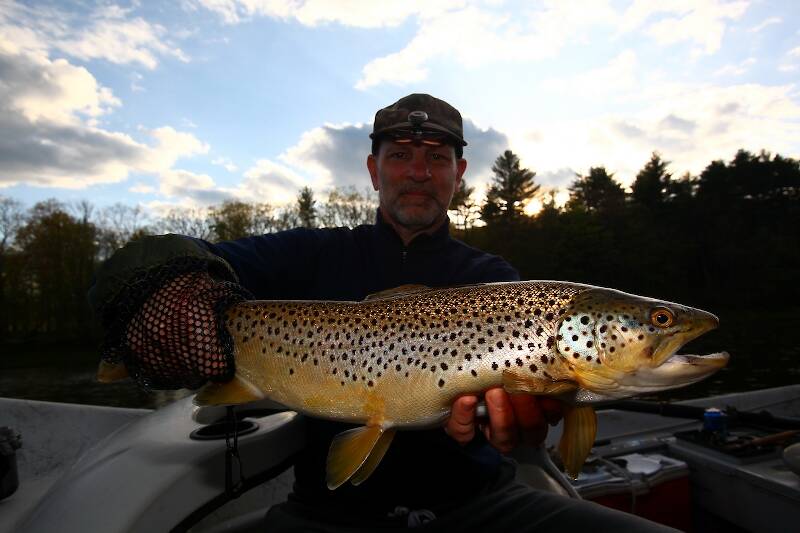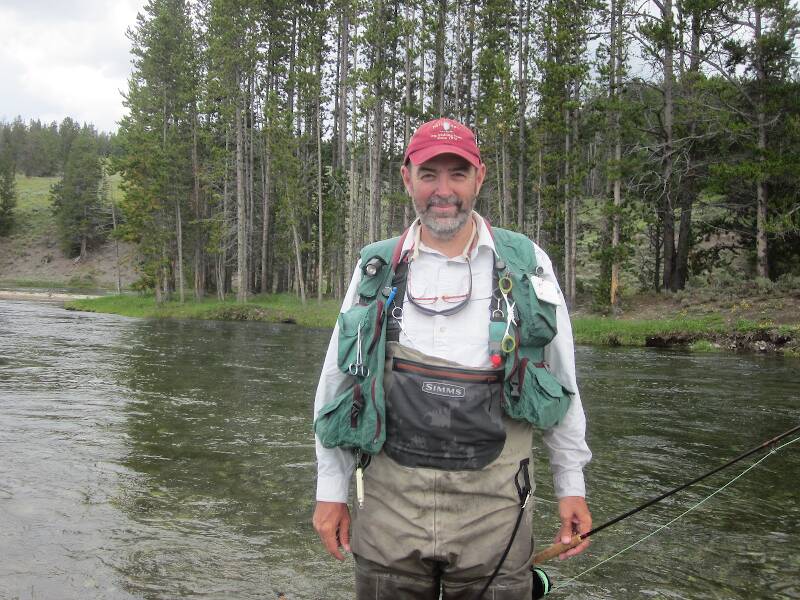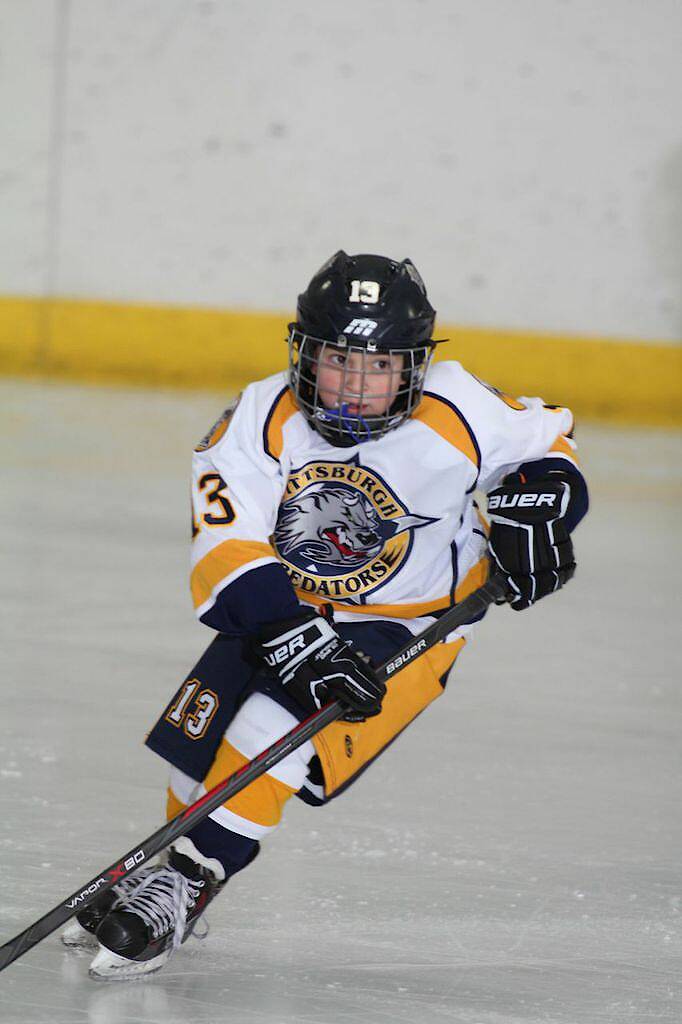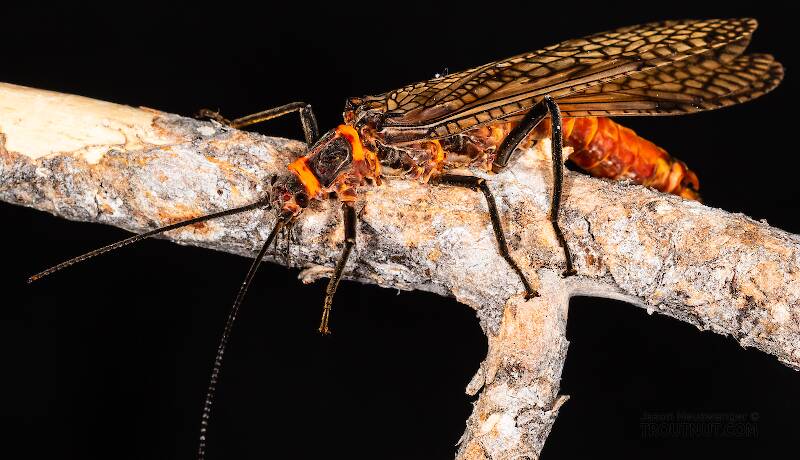
Salmonflies
Pteronarcys californica
The giant Salmonflies of the Western mountains are legendary for their proclivity to elicit consistent dry-fly action and ferocious strikes.
Featured on the forum
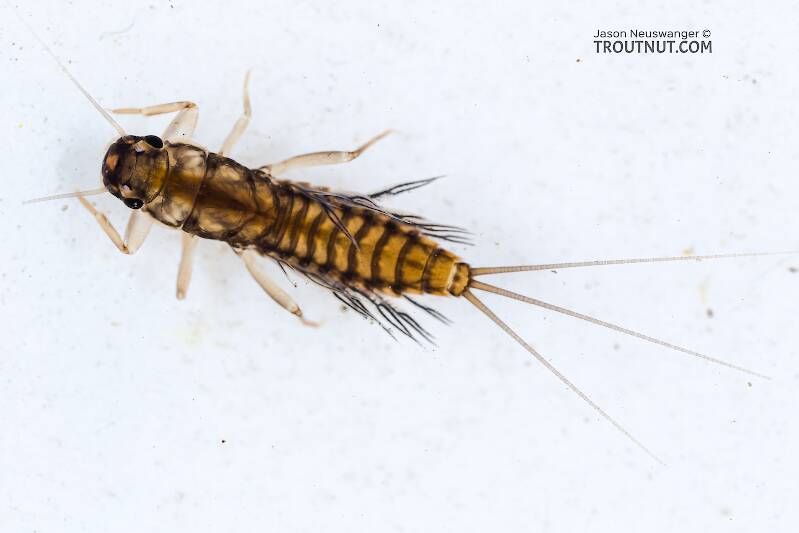
Some characteristics from the microscope images for the tentative species id: The postero-lateral projections are found only on segment 9, not segment 8. Based on the key in Jacobus et al. (2014), it appears to key to Neoleptophlebia adoptiva or Neoleptophlebia heteronea, same as this specimen with pretty different abdominal markings. However, distinguishing between those calls for comparing the lengths of the second and third segment of the labial palp, and this one (like the other one) only seems to have two segments. So I'm stuck on them both. It's likely that the fact that they're immature nymphs stymies identification in some important way.

Troutnut is a project started in 2003 by salmonid ecologist Jason "Troutnut" Neuswanger to help anglers and
fly tyers unabashedly embrace the entomological side of the sport. Learn more about Troutnut or
support the project for an enhanced experience here.
Martinlf on Dec 29, 2006December 29th, 2006, 1:59 am EST
Most interesting! So I may end up using the hooks to tie Klinkhammers. . . :) But let me venture to take issue in a small way with Gonzo, while listening closely and absorbing his main point. (Thanks Jason, for giving me some cover here.) He knows my penchant for upside down ties, and how much I value getting that hook bend out of the water for some of my patterns. Is it possible, though, that these umbrella flies will do something with pressured fish that I believe is important at times--show them a somewhat reasonable facsimile that is new? If they have not become wary of the hook, this new fly, under the right conditions, could be THE FLY one day, even if not every day. I rarely find a fish that will inspect endless offerings without being spooked, but last spring several of these types tortured me during a Baetis hatch on the low clear waters of Spring Creek in State College (Don't worry Jason, nothing I do here could add to the pressure--these fish can name more patterns than Gonzo can, and they can tell the farm the hackle came from.). I ran through my upside down flies, my scud hook emergers, my hackle flies, and everything else before I remembered a fly I had tied from a guide's pattern out west. The first take so surprised me, I missed the hookup. But those picky fish either saw the emerger, tied on a black Varivas scud hook, as someting new or as a more exact copy of what they were dining on. I went home and, perhaps superstitiously, reproduced the exact tie, same hook, same hackle, same wings, same spectrumized dubbing, same dark brown biot with a thin almost reddish brown lighter streak. I must note that a duck butt RS2 also took a few fish that day, though not as many, and that the next picky trout I tried both patterns on (different stream--no name this time) SEEMED to much prefer the RS2! Go figure. Anyway those Ph.D.'d fish at State College may see the umbrella fly this spring, and anytime they'll bite, I'm pleased. I'll finally note that I just wrote up a tying list and all the flies on it, with the exception of Jason's royal Wulff (though I plan to tie it Klink style), come straight from Gonzo's book.
"He spread them a yard and a half. 'And every one that got away is this big.'"
--Fred Chappell
--Fred Chappell
GONZO on Dec 29, 2006December 29th, 2006, 4:53 am EST
Darn! Another refusal!
Louis and Jason, I must confess that sometimes my fly-fisher's mind tends to use this forum as a poor man's substitute for actual fly fishing. Occasionally I'll cast what I think is a seductive statement onto these waters in the hope that I can convince one of you sly and discerning troutnuts to rise to the bait.
In this case, I have presented this particular enticement three times, and have only succeeded in getting rises to adjacent ideas. (Actually, I had previously offered a variation of this lure in another thread, and had no takers.) I need to rethink my strategy! Perhaps my presentation was flawed. Or perhaps the idea was not attractive enough to draw attention amid all the other mind-food on the water.
I think I'll rest the water. I've learned that if you can't get a rise in the first few drifts, you need to stop casting for a while. I don't want to spook my favorite troutnut targets! :)
Louis and Jason, I must confess that sometimes my fly-fisher's mind tends to use this forum as a poor man's substitute for actual fly fishing. Occasionally I'll cast what I think is a seductive statement onto these waters in the hope that I can convince one of you sly and discerning troutnuts to rise to the bait.
In this case, I have presented this particular enticement three times, and have only succeeded in getting rises to adjacent ideas. (Actually, I had previously offered a variation of this lure in another thread, and had no takers.) I need to rethink my strategy! Perhaps my presentation was flawed. Or perhaps the idea was not attractive enough to draw attention amid all the other mind-food on the water.
I think I'll rest the water. I've learned that if you can't get a rise in the first few drifts, you need to stop casting for a while. I don't want to spook my favorite troutnut targets! :)
Martinlf on Dec 29, 2006December 29th, 2006, 9:15 am EST
Gonzo,
Lift! Lift! You may have a fish on and didn't see the cautious rise.
I actually trust your overall logic, and trust that these flies may only work on naive fish, if any, but I do want those Spring Creek fish to be the final arbiters. If they'll eat them, any trout will.
You observed above, 'Even in these situations, I can't see the advantage of emphasizing the "double hernia" hook image over fussy flat-water fish as these flies do.'
With a brain the size of a pea, trout may miss some of the points we have debated so furiously, and simply see something that looks like food up there. If the hook becomes a problem for some fish, it appears that the umbrella fly will at least present a hook image that is very different from the one they get in a standard dry fly. The general argument, anyway, as you well know, is that most fish ignore the hook and focus on the edible image.
So, if real mayflies that are riding high do create the Marinaro footprint, and if under certain conditions that footprint signals food, and if some fish prefer that stage of the bug--now I'm inclined to quote Touchstone, "Your If is the only peacemaker. Much virtue in If"--a fly that creates a footprint and holds the entire body above the water may work well at times, hook visible or not. If the umbrellas work it will be helpful--those darn Goddard flies are so hard to tie, and don't always land wing up.
After all this I now see you don't need to lift yet--I was just following your artful presentation backward, watching for drag. Drag hasn't set in yet, nor have I risen. This will just take some time.
P.S. Perhaps I'm only arguing like a man who just paid too much for a car that may not start: those hooks weren't cheap. Ok, I'll stop beating a dead trout. Er, . . . make that carp.
Lift! Lift! You may have a fish on and didn't see the cautious rise.
I actually trust your overall logic, and trust that these flies may only work on naive fish, if any, but I do want those Spring Creek fish to be the final arbiters. If they'll eat them, any trout will.
You observed above, 'Even in these situations, I can't see the advantage of emphasizing the "double hernia" hook image over fussy flat-water fish as these flies do.'
With a brain the size of a pea, trout may miss some of the points we have debated so furiously, and simply see something that looks like food up there. If the hook becomes a problem for some fish, it appears that the umbrella fly will at least present a hook image that is very different from the one they get in a standard dry fly. The general argument, anyway, as you well know, is that most fish ignore the hook and focus on the edible image.
So, if real mayflies that are riding high do create the Marinaro footprint, and if under certain conditions that footprint signals food, and if some fish prefer that stage of the bug--now I'm inclined to quote Touchstone, "Your If is the only peacemaker. Much virtue in If"--a fly that creates a footprint and holds the entire body above the water may work well at times, hook visible or not. If the umbrellas work it will be helpful--those darn Goddard flies are so hard to tie, and don't always land wing up.
After all this I now see you don't need to lift yet--I was just following your artful presentation backward, watching for drag. Drag hasn't set in yet, nor have I risen. This will just take some time.
P.S. Perhaps I'm only arguing like a man who just paid too much for a car that may not start: those hooks weren't cheap. Ok, I'll stop beating a dead trout. Er, . . . make that carp.
"He spread them a yard and a half. 'And every one that got away is this big.'"
--Fred Chappell
--Fred Chappell
Troutnut on Dec 29, 2006December 29th, 2006, 3:29 pm EST
Don't worry that I'm not rising... I'm just not hungry at the moment!
(Translation: Very busy holiday plans have me spending a tiny fraction of my usual time on the Internet.)
(Translation: Very busy holiday plans have me spending a tiny fraction of my usual time on the Internet.)
Jason Neuswanger, Ph.D.
Troutnut and salmonid ecologist
Troutnut and salmonid ecologist
Upnorth2 on Dec 30, 2006December 30th, 2006, 8:31 am EST
With a brain the size of a pea, trout may miss some of the points we have debated so furiously, and simply see something that looks like food up there. If the hook becomes a problem for some fish, it appears that the umbrella fly will at least present a hook image that is very different from the one they get in a standard dry fly. The general argument, anyway, as you well know, is that most fish ignore the hook and focus on the edible image.
I think you have said what I basically believe. I'm not one for mayfly footprints either. Light changes too much for them to have any real affect and fishing our late-night hatches here......it makes no difference.
You have to be ready for changing conditions and conditioned fish. It takes lots of tricks.
I think you have said what I basically believe. I'm not one for mayfly footprints either. Light changes too much for them to have any real affect and fishing our late-night hatches here......it makes no difference.
You have to be ready for changing conditions and conditioned fish. It takes lots of tricks.
Martinlf on Jan 4, 2007January 4th, 2007, 12:38 am EST
Just tied my first umbrella fly; it looks very good viewed from below, with the extended body and Gonzo style poly wing clearly visible. We'll let the trout be the final judges, though.
"He spread them a yard and a half. 'And every one that got away is this big.'"
--Fred Chappell
--Fred Chappell
Dbinmt on Mar 5, 2010March 5th, 2010, 6:53 am EST
Has anybody had trouble with the umbrella hooks on the "set"? The geometry of the hook looks like the tendency would be for the hook point to be "unset" on the strike, especially a barbless hook. Has anybody bent hooks with the opposite geometry, so the "set" resulted in the hook point being driven deeper?
db
Oldredbarn on Mar 5, 2010March 5th, 2010, 7:59 am EST
db,
This is an interesting area of discussion...Hooks. There is an interesting discussion, though maybe a bit dated, in Datus Proper's, "What the Trout Said"...He goes on at length about the lack of standard sizes, hooking ability, strength, bite etc...I haven't seen much any where else. He actually has some drawings in there with optimal angles etc and hung weights from them until the hook failed.
I sometimes think/worry about some of the materials we actually use in tying undermining what we are trying to do...But there is little "science" or data other than word of mouth here. Trailing shucks and micro fibbets may actually move the barb away from a rising trout. They may be too stiff etc.
I can't tell you if this actually happens, but how would we really know?
I have never used the parachute hook but I have bent hooks etc. The original Klinkhammer was tied on a Partridge hook and was bent down a ways back from the eye and the post tied in there. It's illustrated this way in Oliver Edward's, "Master Class" book. I have never had a hook fail at this point and lose a fish because of it...I can't say, on the other hand, if it's changed the hooking ability because of it.
I have had fish straighten out hooks and shake hooks but it's hard to tell if I have lost a fish because of the shape of the hook. One would hope that someone at these hook companies have done some tests here. Sometimes, with very tiny hooks, I have felt that the hook up quality was impaired a bit.
I guess you will have to be our test case...Bend a few your way and let us know engineer!
Spence
PS I posted this and then pulled it back up...I'm wondering, with the sharpness of our hooks today, whether or not this compensates for the weird shaped hooks. How many times have you had a "splashy refusal" and the fish become foul hooked?
This is an interesting area of discussion...Hooks. There is an interesting discussion, though maybe a bit dated, in Datus Proper's, "What the Trout Said"...He goes on at length about the lack of standard sizes, hooking ability, strength, bite etc...I haven't seen much any where else. He actually has some drawings in there with optimal angles etc and hung weights from them until the hook failed.
I sometimes think/worry about some of the materials we actually use in tying undermining what we are trying to do...But there is little "science" or data other than word of mouth here. Trailing shucks and micro fibbets may actually move the barb away from a rising trout. They may be too stiff etc.
I can't tell you if this actually happens, but how would we really know?
I have never used the parachute hook but I have bent hooks etc. The original Klinkhammer was tied on a Partridge hook and was bent down a ways back from the eye and the post tied in there. It's illustrated this way in Oliver Edward's, "Master Class" book. I have never had a hook fail at this point and lose a fish because of it...I can't say, on the other hand, if it's changed the hooking ability because of it.
I have had fish straighten out hooks and shake hooks but it's hard to tell if I have lost a fish because of the shape of the hook. One would hope that someone at these hook companies have done some tests here. Sometimes, with very tiny hooks, I have felt that the hook up quality was impaired a bit.
I guess you will have to be our test case...Bend a few your way and let us know engineer!
Spence
PS I posted this and then pulled it back up...I'm wondering, with the sharpness of our hooks today, whether or not this compensates for the weird shaped hooks. How many times have you had a "splashy refusal" and the fish become foul hooked?
"Even when my best efforts fail it's a satisfying challenge, and that, after all, is the essence of fly fishing." -Chauncy Lively
"Envy not the man who lives beside the river, but the man the river flows through." Joseph T Heywood
"Envy not the man who lives beside the river, but the man the river flows through." Joseph T Heywood
Martinlf on Mar 7, 2010March 7th, 2010, 3:30 am EST
I've moved to the Gamakatsu C15 BV barbless vertical emerger hook for all my size 20 to size 12 mayfly emergers. I only wish this hook was made in smaller sizes. I may play with the umbrella hooks some more at some time (and I have a few flies tied on it), but I've found the klinkhamer style parachute emerger to be so effective that it's now my go to fly for many hatches. I have some Klinkhamer hooks, but now prefer barbless hooks for their hooking and holding ability and minimal damage to fish. Chris Helm has this hook at Whitetail Fly Tying on the web.
"He spread them a yard and a half. 'And every one that got away is this big.'"
--Fred Chappell
--Fred Chappell
Gutcutter on Mar 7, 2010March 7th, 2010, 12:27 pm EST
martinlf -
where do you get them down to #20?
i have tied most of my cripples on this hook (C 15 BV) for the past few years. i can only find it down to #18. i also love their barbless "crippled emerger" (C 16 B) hook but again only can find it down to #18.
are all japanese mayflies big?
gut
where do you get them down to #20?
i have tied most of my cripples on this hook (C 15 BV) for the past few years. i can only find it down to #18. i also love their barbless "crippled emerger" (C 16 B) hook but again only can find it down to #18.
are all japanese mayflies big?
gut
All men who fish may in turn be divided into two parts: those who fish for trout and those who don't. Trout fishermen are a race apart: they are a dedicated crew- indolent, improvident, and quietly mad.
-Robert Traver, Trout Madness
-Robert Traver, Trout Madness
Martinlf on Mar 7, 2010March 7th, 2010, 2:16 pm EST
Gut,
I'm with you on wanting the Gamakatsu in smaller sizes, but you're right--they only make them down to 18. I tie a transitional mayfly on that hook with a darker biot abdomen and lighter dubbing thorax, so I can usually get away with a bigger bug than the natural since the abdomen part of the fly imitates the nymph with the dun just coming out. I believe it was Harrop who observed that during emergence the fish get used to seeing bigger looking flies (nymph body plus some of the emergent dun) as the bugs emerge. For 20's I use a size 18 Gamakatsu hook and tie it just a bit short. It's perfect for Spring Creek Baetis. For smaller bugs I'll use a Varivas scud hook and mash down the tiny barb, or a Tiemco 2499 SP BL.
--Louis
I'm with you on wanting the Gamakatsu in smaller sizes, but you're right--they only make them down to 18. I tie a transitional mayfly on that hook with a darker biot abdomen and lighter dubbing thorax, so I can usually get away with a bigger bug than the natural since the abdomen part of the fly imitates the nymph with the dun just coming out. I believe it was Harrop who observed that during emergence the fish get used to seeing bigger looking flies (nymph body plus some of the emergent dun) as the bugs emerge. For 20's I use a size 18 Gamakatsu hook and tie it just a bit short. It's perfect for Spring Creek Baetis. For smaller bugs I'll use a Varivas scud hook and mash down the tiny barb, or a Tiemco 2499 SP BL.
--Louis
"He spread them a yard and a half. 'And every one that got away is this big.'"
--Fred Chappell
--Fred Chappell
Gutcutter on Mar 8, 2010March 8th, 2010, 12:49 pm EST
the only problen with the C15BV is that the hook is so damn light. when i first tied on it the flies wouldn't sink into the film, so i used xink on the shuck and that got the ass end down. now, i usually tie a bare thread abdomen with wire rib and coat it with head cement or use pheasant tail ribbed with wire. this really seems to get the abd/shuck down and the cdc keeps the head up.
i also tie (when not in a hurry) the hook to my tippett with a no-slip loop knot. hook seems to set better that way and i suspect that it has something to do with the vertical eye.
the hook is strong and the point is really sharp. i have caught trout over 20" on the 18.
i also tie (when not in a hurry) the hook to my tippett with a no-slip loop knot. hook seems to set better that way and i suspect that it has something to do with the vertical eye.
the hook is strong and the point is really sharp. i have caught trout over 20" on the 18.
All men who fish may in turn be divided into two parts: those who fish for trout and those who don't. Trout fishermen are a race apart: they are a dedicated crew- indolent, improvident, and quietly mad.
-Robert Traver, Trout Madness
-Robert Traver, Trout Madness
Quick Reply
Related Discussions
Topic
Replies
Last Reply
10
Dec 18, 2013
by Brookyman
by Brookyman


